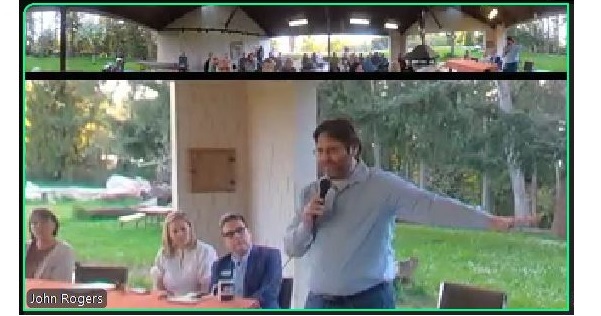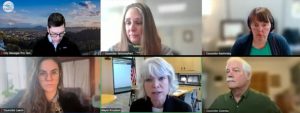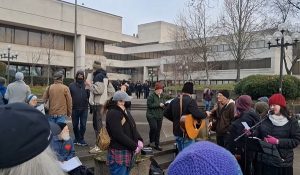One city councilor hopes for a budget compromise
6 min read
Presenter: To balance the budget that will go into effect July 1, the Eugene City Council approved a $10 million annual fee. Opponents collected 8,412 signatures to block the fee from going into effect, to let voters decide:
Should we approve a permanent fee based on building size, which will increase housing costs in Eugene, or should we cut $11.5 million from the budget, which could affect popular services?
During a panel discussion Tuesday at the Southwest Hills neighborhood meeting, Councilor Matt Keating said he thinks there may be other options.
[00:00:39] Matt Keating (Eugene, city councilor, Ward 2): If we go to the ballot, I suspect everyone here would agree it’s going to be a knock-‘em-out, drag-’em-out, costly endeavor, arguably one that no one wins.
[00:00:51] It’s not going to be fun. I’ve worked campaigns all across this country. I understand campaigns. They are costly. And my caution to this community is not just the monetary cost, but the social and political cost of a knock-‘em-out, drag-‘em-out will divide this community. So where can we find common ground?…
[00:01:14] I don’t believe in the binary that we just have Choice A or Choice B. I think there are multiple offramps and there is a opportune moment for our new mayor, Mayor (Kaarin) Knudson, a friend of all of ours here at the table, to partner with stakeholders—and that includes the Chamber—to find a new direction.
[00:01:36] Now, I don’t know what that new direction looks like. My hope is that we can find some common ground and find some offramps that are a new way forward, a different trajectory.
[00:01:51] I don’t know what that looks like, but I’m not going to say that we’re just going to go to the ballot and we’re going to win. I certainly hope we would if we do go to the ballot, but to the point I made earlier: Nobody wins in a divided community. There’s a cost associated with it.
[00:02:11] Presenter: The other city councilor on the panel spoke on behalf of the fire fee for over 28 minutes at the event, or about 35% of all panelists’ time.
[00:02:21] Eliza Kashinsky (Eugene, city councilor, Ward 1): I feel like I’m hogging the mic.
[00:02:23] Presenter: Councilor Eliza Kashinsky:
[00:02:25] Eliza Kashinsky (Eugene, city councilor, Ward 1): I was not afraid to go to the ballot… I actually think we’re going to win when it goes to the ballot.
[00:02:30] Presenter: After the city councilors, the other two panelists were left with about 40% of the speaking time. Here’s Budget Committee Chair Tai Pruce-Zimmerman:
[00:02:41] Tai Pruce-Zimmerman: We have consistently, year after year after year, found ourselves with a gap. Two years ago, that gap calculated out at that time as $8.3 million, that we wrote into that budget as a plug of ‘revenue to be determined.’
[00:03:01] And then we directed the formation of a revenue committee to find a way to fill that plug, to determine what revenue to use for that gap.
[00:03:14] The revenue advisory committee looked at a huge list of different potential revenue sources and that advisory committee came back to Council with the proposal for the fire service fee. But that is where that proposal came from.
[00:03:31] We will be presented on April 30 with a budget that has about $11.5 of cuts in the general fund. And then we will have the pleasure through three more meetings on May 14, 21 and 28 as a committee, determining if the cuts in the city manager’s proposed budget are the ones we want to move forward with, if we will adjust or shift those, and deciding how to get to a balanced budget.
[00:03:59] We will have to make those very hard choices, how to cut $11.5 million to get that budget down to balance, with the revenue that is available at this time.
[00:04:08] And as we go through our process, we’ll forward that on to City Council, they’ll have to pass that in June, and that budget will go into effect on July 1.
[00:04:19] Presenter: The other panelist was Chamber of Commerce President and CEO Brittany Quick-Warner.
[00:04:24] Brittany Quick-Warner (Eugene Area Chamber of Commerce): The official public hearing for this was in late October, early November. We testified in opposition to this fee for a few reasons.
[00:04:31] One, we didn’t feel like it was very transparent. Of the $10 million, $8 million of that is essentially shifting funding out of the general fund and allowing that to backfill other services. Only $2 million of it is new service funding. So we just didn’t feel like it was a very transparent way to actually name this fee.
[00:04:48] We also didn’t appreciate the fact that it could increase at any amount with the vote of City Council, and it was permanent. There was no sunset. There wasn’t a mechanism built into actually reevaluate: Do we still need this fee? Has our budget balanced out? That wasn’t a part of this conversation.
[00:05:04] We expressed those concerns early on. We had conversations with the city, made suggestions of ‘Just call it something else’ or ‘Let’s put a cap on it,’ or ‘Let’s send it to the voters in a few years,’ like, we were all along trying to propose some options that we felt like could make it more palatable.
[00:05:19] And we were also all along saying: We really need a priority-based budgeting conversation with our city, because the reality is we’re living outside of our means at the moment.
[00:05:28] And all of us as individuals living in the community have also absorbed a lot of cost increases. And so we are all experiencing that too. So to say ‘The city is experiencing inflation and increased costs and so we need to increase our taxes’ doesn’t really account for the fact that we’re all also feeling that, right? So this is just adding on.
[00:05:45] So there was a lot of urging the city to look at that priority-based budgeting process and to look at: What could the alternative be? What if we did look at those cuts?
[00:05:54] Presenter: Unfortunately, she said, the council didn’t spend much time deliberating. Brittany Quick-Warner:
[00:06:00] Brittany Quick-Warner (Eugene Area Chamber of Commerce): It was presented to them on Feb. 10, what a menu of possible cuts could look like, and they voted that night to move forward with the fire service fee.
[00:06:10] So there wasn’t a discussion, there wasn’t opportunity for the public to weigh in and say, ‘Wait a minute, what about these services instead of those, and let’s move these around. And what if we adjusted this way? None of those conversations happened because that option was presented to them in the same meeting that they ultimately voted.
[00:06:25] We at that point urged them to just put it to the voters. If this is important and we need this fire service fee, send it to the voters and then go out on a public education campaign from the council’s perspective, because that could have happened in May and they could have had that resolved in the May ballot.
[00:06:40] Council decided not to do that, they moved forward without it, which is their prerogative. And we also said in that letter, we believe that this is going to get referred to the ballot if Council doesn’t make that decision themselves.
[00:06:51] And so once Council did vote, our organization with a whole lot of input from our members and folks in the community said, ‘Okay, we’re going to exercise our right as a organization, as community members, to refer this to the ballot.’
[00:07:04] Presenter: The council now has several options. Brittany Quick-Warner:
[00:07:08] Brittany Quick-Warner (Eugene Area Chamber of Commerce): Council can do nothing and let it go to the ballot in November. They could also send it to a special election in August. They could also repeal the ordinance and move forward in a couple different directions. They could repeal the ordinance and make the cuts. They could repeal the ordinance and come up with an alternative solution.
We are urging them to repeal the ordinance and to look at both cuts and potentially an alternative solution.
[00:07:30] Presenter: Southwest Hills Neighborhood Association sponsors a panel discussion April 15 on the fire fee. One city councilor is open to compromise that will avoid a bitter and expensive election battle.
[00:07:43] This story produced by John Q. and sponsored through the Whole Community Time Bank by generous listeners at KEPW 97.3, Eugene’s PeaceWorks Community Radio.
See also: Councilor Zelenka briefs Laurel Hill Valley on the proposed $10 million fee




